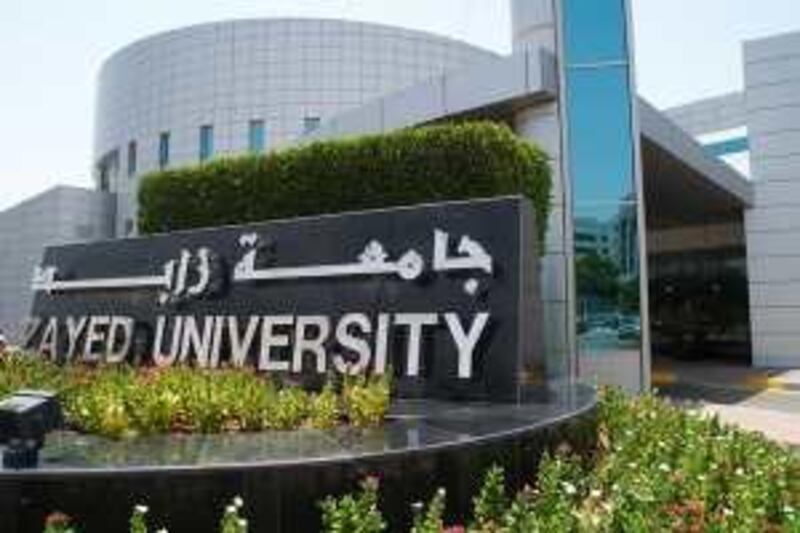ABU DHABI // A lack of long-term job security for foreign academics at the country's public universities is "seriously hindering" the recruitment and retention of top talent, a new survey suggests. However, many academics are content with their salaries, and complaints about a lack of academic freedom are not enough to make them leave the country, the as yet unpublished research from Zayed and UAE universities found.
The absence of tenure - a permanent position that does not have to be renewed - is a major concern to academics here, according to the report, "Expatriate Professors: Balancing the Profession and Financial Rewards". Whatever the faculty might think about the level of academic freedom, "it is not strong enough to let action follow words of dissatisfaction", wrote Kevin Schoepp, assistant director of Zayed University's Abu Dhabi campus, and Dr Ingo Forstenlechner of UAE University in Al Ain.
"This is different with the lack of tenure, which is not only perceived as a problem by a significant share of respondents but as a strong enough one to shorten the likelihood of staying in the host country." Academic tenure is broadly designed to ensure that academics cannot be sacked for unpopular research and is seen as a pillar of western academia. The UAE's public universities are keen to be seen to conform to western academic standards and have or are seeking international accreditation.
"If Gulf countries are serious about building world-class capacity in their academic environment these issues will need to be addressed," the report said. "This would require profound institutional change and while anecdotal evidence suggests movement in this direction, the results remain to be seen." The vast majority of academics in the country are foreigners. In 2007, all of Zayed University's 265 academics, nearly all the 1,092 academic staff at the Higher Colleges of Technology and 570 out of 747 academics at UAE University were expatriates.
The research was based on confidential e-mailed responses from 364 foreign academics at the country's public universities and colleges. Some 1,600 academics were invited to take part. While most expatriate academics were satisfied with their salaries - pitched to match those at western universities but with the advantage of being tax-free - 43 per cent were dissatisfied with their lack of tenure and involvement in institutional decision-making over issues such as the curricula and recruitment.
"The university power structure is top-down like the wider power structure in the country. Things happen very quickly here, which means that the people at the top have more decision-making to do than is the case in the West," said Mr Schoepp. "In terms of professional security, it's also difficult to have a vested interest in a place if you might only be employed for a few years." Mr Schoepp suggested that while western-style tenure may not be possible, longer or rolling contracts could increase satisfaction among academics.
"But overall the research actually shows that academics here are quite happy. Most people who take the decision to come here understand what they are entering into," he said. Responding to the report, Dr Simon Jones, director of Abu Dhabi Men's College, said that despite the absence of tenure, academics spent an average of seven years at the institution, which he said was "well above average" compared to most western European institutions.
"We don't find [the lack of tenure] an issue," he said. "I cannot remember anyone turning us down because we don't have a tenure track system." Bryan Gilroy, assistant provost at Zayed University, said there were drawbacks to awarding tenure. "With contracts, you are aware you always have to perform," he said. "There are lots of examples in the [United] States where people have got tenured positions and are not as productive as they should be."
Like Mr Schoepp, Mr Gilroy said longer contracts of five or six years were an alternative to tenure. However, a former academic at a government university, who asked not to be named, said longer contracts might not improve job security since they were difficult to enforce. "The situation in the UAE in terms of employment is not the same as in other places," she said. "These contracts for which people can come can be broken quite easily."
tspender@thenational.ae dbardsley@thenational.ae






